Episodes
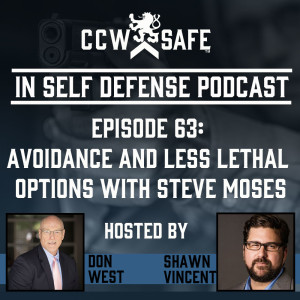
Wednesday Aug 12, 2020
In Self Defense - Episode 63: Avoidance and Less Lethal Options with Steve Moses
Wednesday Aug 12, 2020
Wednesday Aug 12, 2020

Steve Moses joins Don West and Shawn Vincent in exploring three cases we’ve talked about before, but this time Steve provides tactical explanations on how avoidance or less lethal options could have changed the outcomes of these self-defense scenarios. This includes an illuminating conversation about OC spray.
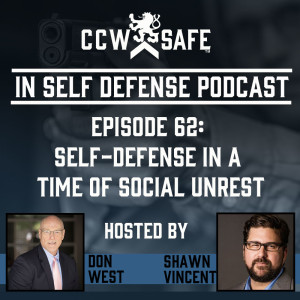
Wednesday Aug 05, 2020
In Self Defense - Episode 62: Self-Defense in a Time of Social Unrest
Wednesday Aug 05, 2020
Wednesday Aug 05, 2020

During a time of social unrest, concealed carriers may find themselves in confrontations involving people in or around protests. We’ve seen news reports of both, including an incident in Austin, Texas where there was a tragic loss of life. Don West, Steve Moses, and Shawn Vincent explore the challenges associated with defending yourself should you find yourself in a protest -- or surrounded by one.
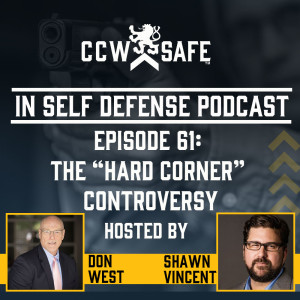
Friday Jul 31, 2020
In Self Defense - EPISODE 61: The “Hard Corner” Controversy
Friday Jul 31, 2020
Friday Jul 31, 2020

A recent CCW Safe article sparked controversy over a suggestion that a homeowner could have “retreated” from a potential intruder in their home and taken up a tactical position in a “hard corner.” In this podcast Don West, Steve Moses, and Shawn Vincent address the controversy, discuss the differences between a “retreat” and a “tactical withdrawal,” and reinforce the benefits that time and distance can offer a defender in a self-defense scenario -- both from a tactical and a legal perspective.
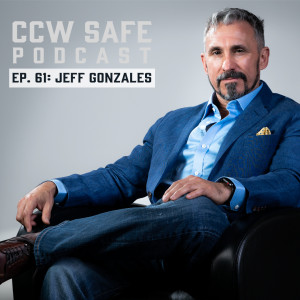
Wednesday Jul 29, 2020
CCW Safe Podcast- Episode 61: Jeff Gonzales Trident Concepts
Wednesday Jul 29, 2020
Wednesday Jul 29, 2020

This week Mike and Stan have Trident Concepts owner and former Navy SEAL Jeff Gonzales in studio to discuss training for concealed carriers, the influx of new gun owners and the new video series that Jeff is doing for CCW Safe.
For more info about Jeff and the training his company offers visit: https://www.tridentconcepts.com/
Learn more about our company and how we can protect you and your family by visiting: www.ccwsafe.com

Wednesday Jun 03, 2020
CCW Safe Podcast- Episode 60 with Don West
Wednesday Jun 03, 2020
Wednesday Jun 03, 2020

This week Mike and Stan have CCW Safe National Trial Counsel Don West in studio to discuss some of the self-defense law questions we have been getting in the wake of the civil unrest currently happening across the country.
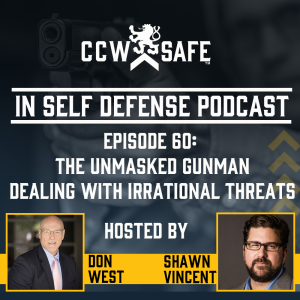
Wednesday May 27, 2020
In Self Defense - Episode 60: The Unmasked Gunman Dealing With Irrational Threats
Wednesday May 27, 2020
Wednesday May 27, 2020

Steve Moses joins Don West and Shawn Vincent in a discussion about a security guard who was murdered, ostensibly, for demanding a young woman wear a mask in a retail store. While the shooting was inexcusable, Steve points out some ways the security guard mishandled the situation and offers advice for dealing with irrational people as a concealed carrier.
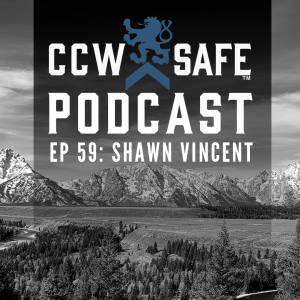
Wednesday May 20, 2020
CCW Safe Podcast- Episode 59: Shawn Vincent on Self-Defense Cases
Wednesday May 20, 2020
Wednesday May 20, 2020

This week Stan and Mike interview Shawn Vincent. Shawn is a jury consultant and author who writes a weekly article for CCW Safe detailing self-defense cases and looks at the legal results of those incidents.
Follow Us on Social Media:
FACEBOOK: http://Facebook.com/CCWSAFE
YOUTUBE: http://www.youtube.com/ccwsafe
Keep up with our weekly blogs, podcasts, and interviews published weekly in the News section of our site: https://ccwsafe.com/blog
CONTACT US
Please direct any inquires to a member of the CCW Safe Support team at (405) 724-8501 or via email at support@ccwsafe.com.
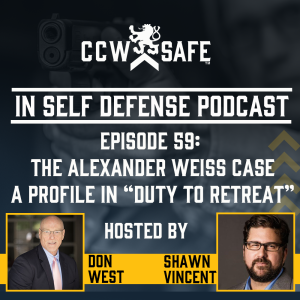
Wednesday May 13, 2020
In Self Defense - Episode 59: The Alexander Weiss Case A Profile in “Duty to Retreat”
Wednesday May 13, 2020
Wednesday May 13, 2020

Don West and Shawn Vincent look at the Alexander Weiss case from Rochester, Minnesota. After a traffic accident, a confrontation erupted into violence, and Weiss’ decision to retrieve his pistol from his car raised questions about his duty to retreat. The controversial case resulted in two mistrials due to hung juries before the prosecutor reluctantly dropped second degree murder charges.
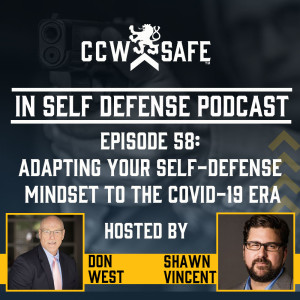
Wednesday May 06, 2020
In Self Defense - Episode 58: Adapting Your Self-Defense Mindset to the COVID-19 Era
Wednesday May 06, 2020
Wednesday May 06, 2020

Don West and Shawn Vincent are joined by Steve Moses to discuss how concealed carriers can adjust their thinking when dealing with new treats that have appeared during the COVID-19 pandemic. While the types of threats we may encounter may have changed, the laws governing self-defense have not. Here are some good strategies for staying safe and lowering your legal liability in the face of previously unimagined self-defense concerns.

Wednesday Apr 29, 2020
CCW Safe Podcast- Episode 58: Larry Vickers
Wednesday Apr 29, 2020
Wednesday Apr 29, 2020

This week Mike and Stan are joined by Larry Vickers. They discuss the influx of new gun owners due to COVID-19 and some things that new gun owners should consider. These include safety, training and situational awareness along with the guys talking about the biggest traps they see new owners falling in.

